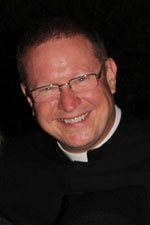 CHARLOTTE — Looking to help make wishes come true for children with life-threatening illnesses and their families, Father Christopher Roux, rector of St. Patrick Cathedral, will hike 28.3 miles for the annual Make-A-Wish Spring Trailblaze Challenge the weekend of May 18-20.
CHARLOTTE — Looking to help make wishes come true for children with life-threatening illnesses and their families, Father Christopher Roux, rector of St. Patrick Cathedral, will hike 28.3 miles for the annual Make-A-Wish Spring Trailblaze Challenge the weekend of May 18-20.
The Trailblaze Challenge is an endurance hike where participants tackle the terrain of the Foothills Trail – in one day. This is a hike, not a race, and it caters to all levels of hiking ability, from novices to advanced outdoor enthusiasts.
This is the sixth time in four years that Father Roux and small groups of cathedral parishioners, which he calls “Pat’s Peeps,” have participated to raise funds to help grant the wishes of children who have life-threatening medical conditions.
First-time hikers have a minimum goal of raising at least $2,500. In subsequent years, hikers strive to raise at least $2,400. This year Father Roux will be joined by parishioner Jason Murphy, so they have a combined minimum goal of $4,800.
Since on average each wish can cost approximately $6,000, Father Roux is really striving to raise enough to fund one wish and two if possible, so his goal is between $6,000 and $12,000 for the Make-A-Wish Foundation.
“It is a wonderful thing,” Father Roux said. “When we have our Make-A-Wish weekend, previous Wish families come down and tell their stories. In the midst of all of the difficulty they have – with their kids with doctor’s visits, treatments and day-to-day life responsibilities – this gives them a period of time when they have some good memories.”
“The family doesn’t have to worry about anything,” he said. “Make-A-Wish does everything they can to make this a pleasant experience where the family can just enjoy being a family with their child.
“As time goes on, if the child continues to be sick or, sadly, passes away, they have that memory to hold onto – a memory that was happy.”
Wishes range from a visit to Walt Disney World, to swimming with dolphins, from being a soldier at Fort Bragg for a day, to being a Carolina Panther for a day.
Make-A-Wish Central and Western North Carolina hopes to grant more than 360 wishes for children in need this year.
For more information about aiding in the effort, go to www.kintera.org/faf/home/default.asp?ievent=1167406 and select Spring 2018 Hikes. Once on the webpage, select hiker name “Christopher Roux.”
— SueAnn Howell, senior reporter
CHARLOTTE — St. Matthew Church is helping build stronger families through programs that promote healthy relationships. For nearly 10 years, the parish has offered marriage and parenting classes to help members turn natural conflict into opportunities for greater connection and intimacy.
“The Power of Calm for Parents” is held each spring, and “The Power of Calm for Marriage” is held in the fall. Participants meet for six two-hour sessions that involve watching a DVD, group discussion and workbook exercises that help them explore their unique family dynamics.
The programs are based on the books “ScreamFree Marriage” and “ScreamFree Parenting” and material by Hal Runkel, a marriage and family therapist, author and international speaker. A major focus is learning how to manage emotional reactivity so that one can respond instead of react during conflict. Parents learn how to empower their children by giving them choice, while also allowing them to learn through natural consequences. Couples discover a “Calm Down. Grow Up. Get Closer.” approach to the natural conflict of marriage that draws them closer.
“St. Matthew sees the family as an essential element of a healthy faith community. When families are stressed, hurting and struggling, we as a church need to provide help,” said Michael Burck, the parish’s adult faith formation director. “We know parents feel resourced, supported and empowered by these programs, and we intend to continue supporting families in practical and meaningful ways in the future.”
Kara Griffin, mother of two, attended the parenting class with her husband Chris last year. “We had a great experience. The group process helped us to not feel so alone, to look introspectively at our behaviors and to explore techniques to try out when struggling. As parents, we don’t always have effective tools to fall back on. And it’s a wonderful way to discuss, share and adopt new methods of parenting and ‘managing self’.”
Catherine Sforza, who leads the St. Matthew Mom’s Group, agreed. “Having children is such a blessing, so I’m always looking for ways to improve my parenting skills to help me be the best mom I can be. Learning new tools enabled us to establish a peaceful home and allowed my relationship with my kids to grow in a positive direction, especially in how we communicate with each other and how we act as a family.”
An important component of both programs is the group environment that supports and affirms its members, said Licensed Marriage and Family Therapy Associate Jenny Cox, who has facilitated the programs for five years. “Family relationships can be challenging. Providing an accepting and supportive space where we can come together to share our struggles and help each other grow is so powerful! We always end our sessions with the Serenity Prayer to remind us that we are works in progress and God is always with us.”
St. Matthew Church will offer the next Power of Calm for Parents from 7 to 9 p.m. on Wednesdays, April 11-May 16. To register, go online to www.stmatthewcatholic.org/SMU For more information, email Cox at This email address is being protected from spambots. You need JavaScript enabled to view it..
— Jenny Cox, correspondent and facilitator of the “Power of Calm” programs at St. Matthew Church.

